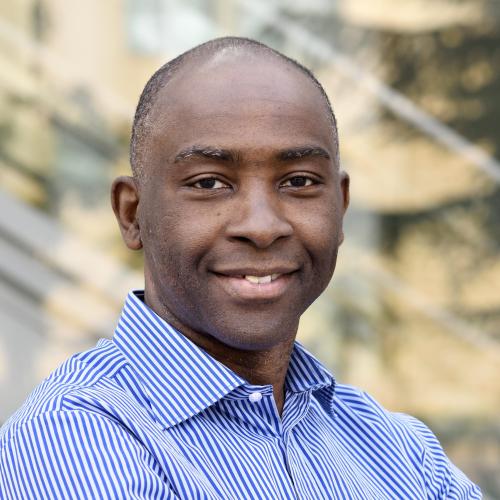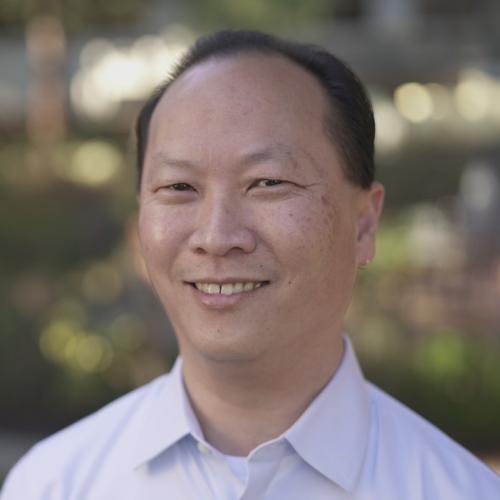

The true potential of AI rests on super-human learning capacity, and on the ability to selectively draw on that learning. Both of these properties – scale and selectivity – challenge the design of AI computers and the tools used to program them. A rich pool of new ideas is emerging, driven by a new breed of computing company, according to Graphcore co-founder Simon Knowles. At the AI Hardware Summit, Phil Brown, VP Scaled Systems Product discusses the creation of the Intelligence Processing Unit (IPU) – a new type of processor, specifically designed for AI computation. He looks ahead, towards the development of AIs with super-human cognition, and explores the nature of computation systems needed to make powerful AI an economic everyday reality.

Phil Brown
Phil leads Graphcore’s efforts to build large scale AI/ML processing capability using Graphcore unique Intelligence Processing Units (IPUs) and IPU-Fabric and Streaming Memory technology. Previously he has held a number of different roles at Graphcore including Director of Applications, leading development of Graphcore’s flagship AL/ML models, and Director of Field Engineering, which acts as the focal point for technical engagements with our customers. Prior to joining Graphcore, Phil worked for Cray Inc. in a number of roles, including leading their engagement with the weather forecasting and climate research customers worldwide and as a technical architect. Phil holds a PhD in Computational Chemistry from the University of Bristol.
Graphcore
Website: https://www.graphcore.ai/
We’re optimistic for a future where people live healthier, more informed, more creative lives. We see a world where technology enhances human potential, and takes us into a new era of intelligence and progress that everyone can benefit from.
We let innovators create the next breakthroughs in machine intelligence.
We believe our Intelligence Processing Unit (IPU) technology will become the worldwide standard for machine intelligence compute. The Graphcore IPU is going to be transformative across all industries whether you are a medical researcher, roboticist or building autonomous cars.
We have created a completely new processor, the IPU, specifically designed for AI compute. The IPU’s unique architecture lets AI researchers undertake entirely new types of work, not possible using current technologies, to drive the next advances in machine intelligence.

Kunle Olukotun
Kunle Olukotun is the Cadence Design Professor of Electrical Engineering and Computer Science at Stanford University. Olukotun is a renowned pioneer in multi-core processor design and the leader of the Stanford Hydra chip multiprocessor (CMP) research project.
Prior to SambaNova Systems, Olukotun founded Afara Websystems to develop high-throughput, low-power multi-core processors for server systems. The Afara multi-core processor, called Niagara, was acquired by Sun Microsystems and now powers Oracle’s SPARC-based servers.
Olukotun is the Director of the Pervasive Parallel Lab and a member of the Data Analytics for What’s Next (DAWN) Lab, developing infrastructure for usable machine learning.
Olukotun is an ACM Fellow and IEEE Fellow for contributions to multiprocessors on a chip and multi-threaded processor design. Olukotun recently won the prestigious IEEE Computer Society’s Harry H. Goode Memorial Award and was also elected to the National Academy of Engineering—one of the highest professional distinctions accorded to an engineer.
Kunle received his Ph.D. in Computer Engineering from The University of Michigan.

Rodrigo Liang
Rodrigo is CEO and co-founder of SambaNova Systems. Prior to joining SambaNova, Rodrigo was responsible for SPARC Processor and ASIC Development at Oracle. He led the engineering organization responsible for the design of state-of-the-art processors and ASIC's for Oracle's enterprise servers.
SambaNova
Website: https://www.sambanovasystems.com/
We are a computing startup focused on building the industry’s most advanced systems platform to run AI applications from the datacenter to the edge.
Cerebras Systems builds the fastest AI accelerators in the industry. In this talk we will review how the size and scope of massive natural language processing (NLP) presents fundamental challenges to legacy compute and to traditional cloud providers. We will explore the importance of guaranteed node to node latency in large clusters, how that can’t be achieved in the cloud, and how it prevents linear and even deterministic scaling. We will examine the complexity of distributing NLP models over hundreds or thousands of GPUs and show how quickly and easily a cluster of Cerebras CS-2s is set up, and how linear scaling can be achieved over millions of compute cores with Cerebras technology. And finally, we will show how innovative customers are using clusters of Cerebras CS-2s to train large language models in order to solve both basic and applied scientific challenges, including understanding the COVID-19 replication mechanism, epigenetic language modelling for drug discovery, and in the development of clean energy. This enables researchers to test ideas that may otherwise languish for lack of resources and, ultimately, reduces the cost of curiosity.

Andy Hock
Dr. Andy Hock is VP of Product Management at Cerebras Systems with responsibility for product strategy. His organization drives engagement with engineering and our customers to inform the hardware, software, and machine learning technical requirements and accelerate world-leading AI with Cerebras’ products. Prior to Cerebras, Andy has held senior leadership positions with Arete Associates, Skybox Imaging (acquired by Google), and Google. He holds a PhD in Geophysics and Space Physics from UCLA.
Cerebras
Website: https://www.cerebras.net/
Cerebras Systems is a team of pioneering computer architects, computer scientists, deep learning researchers, and engineers of all types. Cerebras have come together to accelerate generative AI by building from the ground up a new class of AI supercomputer. Their flagship product, the CS-3 system, is powered by the world’s largest and fastest AI processor, our Wafer-Scale Engine-3. CS-3s are quickly and easily clustered together to make the largest AI supercomputers in the world, and make placing models on the supercomputers dead simple by avoiding the complexity of distributed computing. Leading corporations, research institutions, and governments use Cerebras solutions for the development of pathbreaking proprietary models, and to train open-source models with millions of downloads. Cerebras solutions are available through the Cerebras Cloud and on premise. For further information, visit https://www.cerebras.net or follow us on LinkedIn or X.

Lip-Bu Tan
Lip-Bu Tan is chief executive officer of Intel Corporation and serves on the company’s board of directors. He was appointed to his position in March 2025.
Tan is an accomplished executive with more than two decades of semiconductor and software experience and deep relationships across the technology ecosystem. He has received several accolades for his significant contributions to the industry, including the 2022 Robert N. Noyce Award, the Semiconductor Industry Association’s highest honor, and was named one of Forbes’ Top 50 Venture Capitalists.
Tan previously served as chief executive officer of Cadence Design Systems Inc. and was also a member of its board of directors. During his 12 years as Cadence’s chief executive officer, he led a reinvention of the company and drove a cultural transformation centered on customer-centric innovation that enabled Cadence to more than double its revenue, expand operating margins and significantly outperform the market.
Tan is a founding managing partner of Walden Catalyst Ventures and chairman of Walden International, a leading venture capital firm. He has also served on the boards of public companies Credo Technology Group and Schneider Electric.
Tan holds a Bachelor of Science in physics from Nanyang Technological University in Singapore, a Master of Science in nuclear engineering from the Massachusetts Institute of Technology and an MBA from the University of San Francisco.

Alexis Black Bjorlin
Dr. Alexis Black Bjorlin was previously VP, Infrastructure Hardware Engineering at Meta. She also serves on the board of directors at Digital Realty and Celestial AI. Prior to Meta, Dr. Bjorlin was Senior Vice President and General Manager of Broadcom’s Optical Systems Division and previously Corporate Vice President of the Data Center Group and General Manager of the Connectivity Group at Intel. Prior to Intel, she spent eight years as President of Source Photonics, where she also served on the board of directors. She earned a B.S. in Materials Science and Engineering from Massachusetts Institute of Technology and a Ph.D. in Materials Science from the University of California at Santa Barbara.

Marshall Choy
Marshall Choy is Senior Vice President of Product at SambaNova Systems and is responsible for product management and go-to-market operations. Marshall has extensive experience leading global organizations to bring breakthrough products to market, establish new market presences, and grow new and existing lines of business. Marshall was previously Vice President of Product Management at Oracle until 2018. He was responsible for the portfolio and strategy for Oracle Systems products and solutions. He led teams that delivered comprehensive end-to-end hardware and software solutions and product management operations. Prior to joining Oracle in 2010 when it acquired Sun Microsystems, he served as Director of Engineered Solutions at Sun. During his 11 years there, Marshall held various positions in development, information technology, and marketing.

AI Hardware Summit attendees are invited to attend the an extended networking session where they can meet attendees from across both events. The Meet & Greet is a perfect opportunity to reconnect with peers, expand your network, and discuss the state of ML across the cloud-edge continuum!

Colin Murdoch
Decades of international commercial experience and deep technical expertise mean Colin is uniquely placed to ensure DeepMind’s cutting-edge research benefits as many people as possible. As Chief Business Officer of DeepMind, he oversees a wide-range of teams including Applied, which applies research breakthroughs to Google products and infrastructure used by billions of people. He also helps drive the growth of DeepMind, building and leading critical functions including finance and strategy and leading external and commercial partnerships. Originally an electronics and software engineer, he has held senior positions at both start-ups and global companies such as Thomson Reuters, helping them solve their own complex, mission-critical, real-world challenges.

Cade Metz
Cade Metz is a reporter with The New York Times, covering artificial intelligence, driverless cars, robotics, virtual reality, and other emerging areas. Genius Makers is his first book. Previously, he was a senior staff writer with Wired magazine and the U.S. editor of The Register, one of Britain’s leading science and technology news sites.
A native of North Carolina and a graduate of Duke University, Metz, 48, works in The New York Times’ San Francisco bureau and lives across the bay with his wife Taylor and two daughters.
AMD
Website: https://www.amd.com/en
For more than 50 years AMD has driven innovation in high-performance computing, graphics and visualization technologies. Billions of people, leading Fortune 500 businesses and cutting-edge scientific research institutions around the world rely on AMD technology daily to improve how they live, work and play. AMD employees are focused on building leadership high-performance and adaptive products that push the boundaries of what is possible. For more information about how AMD is enabling today and inspiring tomorrow, visit the AMD (NASDAQ: AMD) website, blog, Facebook and Twitter pages.





